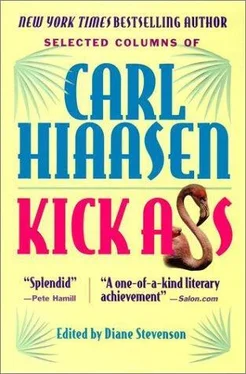Even the most cold-hearted bureaucrat could grasp the awful irony. To the Haitians on that creaky sailboat, the Cuban rafters must've seemed like kindred travelers—poor, like themselves, but brave enough to risk an ocean crossing in pursuit of a new life. Of course the Haitians would reach out and help; they shared the same dream.
Then with the interdiction came the bad news, and excuses: The Cubans get to stay because Cuba won't take them back. The Haitians have to go because Haiti will. So much for being good Samaritans. News of the refugees' plight sent a crackle of anger through Miami's Haitian community. This time the discrimination was so flagrant—and the juxtaposition so sad—that politicians had no place to hide. How could one seriously defend a policy that welcomed Cuban refugees but rejected the Haitians who had saved them?
Last week, a new spark erupted. All it took was one stark, indelible image on television: Haitian stowaways, manacled and caged on the hot deck of a freighter.
It could've been a flashback to the 1500s, when slave ships sailed the tropics. But this was 1991 in Miami, Florida. The United States of America.
Where men whose only crime was to seek a better future were being locked in chains.
The five stowaways were removed from the freighter and brought to the Haitian consulate. Arrangements were made to send them home. When immigration officers arrived to take them to the airport, the Haitians cried and struggled and begged to stay. In the scuffle, one managed to escape.
Most of that, too, was captured on television. It was painful to watch.
But if you stayed tuned a little longer, you saw another kind of immigration story, one with a cheerier angle. A young Cuban baseball player named Rene Arocha had defected to the United States, slipping away from his teammates during a stopover in Miami.
Now Arocha was being hailed as a hero, wined and dined and fitted with a new Italian suit and a silk necktie. No manacles on his wrists, no INS agents at his side. Arocha told reporters that he throws a 92 mph fastball. He said he wants to play in the major leagues. One of his former coaches called him "the Dwight Gooden of Cuba."
Back home, Arocha led a more comfortable and privileged life than many of his countrymen. He was not a political activist, just a ballplayer with a good right arm. He didn't leave Cuba to escape persecution, but to seek fortune. He said lots of other players would love to do the same thing.
And why not? In America, a 92 mph fastball is worth millions of dollars. A Wheaties commercial can't be far behind.
That Arocha will be allowed to stay is a foregone conclusion. INS looks favorably on sports celebrities. It matters little that he isn't a true political refugee; neither was Ivan Lendl or Martina Navratilova.
Destitute Haiti, not having an abundance of tennis courts or baseball diamonds, doesn't produce many tennis pros or big-league pitchers. But it is a place that, like Cuba, produces many brave dreamers.
To favor some over others is more than an injustice. It shames this country, and all of us whose ancestors made the same journey.
Racism adds to the pain of repatriations
February 2, 1992
The cutters are on the way, carrying hundreds of heartbroken souls to a place where mad-dog soldiers go on murder sprees.
Our own government admits as much. The U.S. ambassador to Haiti was briefly recalled in protest of bloody thuggery against a political candidate. Last week, for the first time, diplomats mentioned military intervention as a possible option.
Yet the Supreme Court, by a 6-3 vote, says the Haitians can be "repatriated," a sterile euphemism for what's really happening: They're being returned to the bowels of hell.
Many Floridians, though saddened, also feel a secret sense of relief. It's not because they're coldhearted xenophobes—they're not. They are simply weary and worried.
Miami has absorbed more immigrants, in a shorter time, than any city in recent history. The resources here are stretched dangerously beyond their limits. Schools are jammed. The county hospital is overwhelmed. The jails are overflowing. Decent, affordable housing is a fiction.
From a practical view, it's insane to accept thousands more refugees when we can't care for those who are already here. From a moral view, though, it's hard to defend slamming the door.
U.S. immigration laws are disgracefully riddled with double standards. If everyone were treated the same, we wouldn't have the depressing spectacle now unfolding in the Caribbean.
The Haitians' major disadvantage is being Haitian. If they were Mexicans, we'd invite them to pick lettuce in California. If they were Nicaraguans, we'd let them wait here until we're sure Managua is running a democracy. And if they were Cubans, they'd be welcomed the moment they were plucked from the sea.
For years, the INS defended itself with a standard line: Most Haitians trying to enter the United States were fleeing poverty, not political persecution. This made them deportable.
New events have turned U.S. policy inside out. Today Haiti is wracked by bloody turmoil, and Cuba's economy is rotting. Florida is receiving political refugees from Port-au-Prince and economic refugees from Havana. Language is the main difference between them.
You cannot separate tyranny from the despair it produces, whether the tyrant is named Duvalier or Castro. Like Cubans, Haitians are victims of generations of political oppression. It isn't fair for the law to treat them differently, but it does.
Think of the outcry if the Coast Guard began hauling Cuban rafters back to Havana, or shipped them to a sweltering barbed-wire camp! Every politician in South Florida would scream bloody murder.
Haitian refugees have few such powerful supporters. Sen. Connie Mack has spoken most strongly for their cause—but a sad cause it is, because there's no painless, or shameless, solution.
It would be folly to throw open our borders to all who are poor and hungry, or who suffer under a harsh, neglectful regime. We'd be swamped. Given a choice, half the hemisphere would pack up and move to Miami in a heartbeat.
But if we're firm about restricting immigration, then we also must be fair. Racist policies add to the pain of those we shut out, and to the misery of waiting relatives.
Today, U.S. strategy is to gild the double standards and set a stern example that will scare potential refugees. The sight of overcrowded American cutters pulling into Port-au-Prince harbor might deter future voyagers, but not for long. Dreams die hard on the coast of Haiti.
In a dozen tiny inlets, old boats are being patched, sails stitched, provisions hoarded. Men gather with nervous families. A captain arrives, and money changes hands—someone's life savings.Then the journey to Florida begins.
Those who fail the first time will surely try again.
Any sane person would.
Keep goodwill afloat at sea: Sink INS piracy
October 24, 1993
The newest pirate of the high seas doesn't even have a cannon.
It's the U.S. Immigration and Naturalization Service, which is extracting heavy booty from ships that rescue refugees at sea. Blackbeard himself would be envious.
Last week, crew members aboard the cruise liner Royal Majesty, sailing between Miami arid Cozumel, Mexico, spotted a flare in the night sky. Using searchlights, Capt. Petro Maratos found a raft carrying eight Cuban refugees.
The men had been at sea for five days. Some were dehydrated and hallucinating. The Royal Majesty picked them up and took them to Key West.
For its act of kindness, the cruise ship now faces a $24,000 fine. That's $3,000 per rafter. According to INS policy, anybody who brings undocumented immigrants ashore is subject to monetary penalties.
Читать дальше









